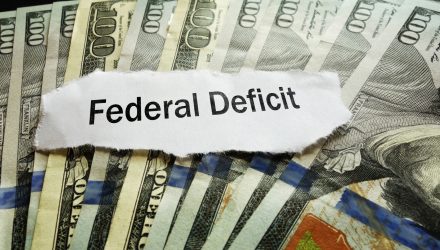The Congressional Budget Office said in a new report on Wednesday that Federal deficits could reach higher levels in the next 10 years versus what was previously expected. In addition, the CBO cited that U.S. President Donald Trump’s latest tariffs on China would lower gross domestic product (GDP) by 2020, and that further tariff hikes could hamper economic growth.
The department is estimating that the deficit will reach $960 billion for the 2019 fiscal year, which will end on Sept. 30. Further estimates show that number to reach $1 trillion for the 2020 fiscal year, which would mark the first time the deficit would cross that threshold since the 2012 fiscal year.
Per a LA Times report, “Economists are increasingly warning that a recession may be on the horizon, with a key segment of the so-called yield curve on U.S. Treasury notes briefly inverting last week, a rare occurrence that has historically presaged a recession. The odds of a U.S. downturn in the next 12 months rose to 35% in Bloomberg’s August survey of economists, from 31% forecast previously.”
“Trade policies” are weighing on economic activity, “particularly business investment,” the CBO said.
“If trade barriers rose higher or concerns about such developments increased, domestic investment and output could be slower than we project,” the agency added.
Key highlights of the report:
- Real GDP is projected to grow to 2.3% in 2019
- But after 2019, annual output growth is expected to slow down to an average of 1.8% through 2029 — lower than the long-term historical average
- “That slowdown occurs primarily because the labor force is expected to grow more slowly than it has in the past,” the CBO says
- Federal debt held by the public is projected to grow to 95% of GDP in 2029 from 79% in 2019. The 2029 debt projection will be “its highest level since just after World War II”
- The recently passed budget deal is expected to add roughly $1.7 trillion to the cumulative deficits between 2020 and 2029
- The expected increase in deficits is partly offset, however, by a $1.1 trillion net reduction in the CBO’s projections of interest costs over the following 10 years
- That’s mostly because the CBO revised its forecast for interest rates downward from the prior report, which lowered its projections for net interest spending
Kinda amazing. CBO increases size of projected deficits (because Congress changed the law and is spending more than it said it would) yet CBO decreases projected level of interest rates over the next decade. pic.twitter.com/ckHLAwuquC
— David Wessel (@davidmwessel) August 21, 2019
For more market trends, visit ETF Trends.


